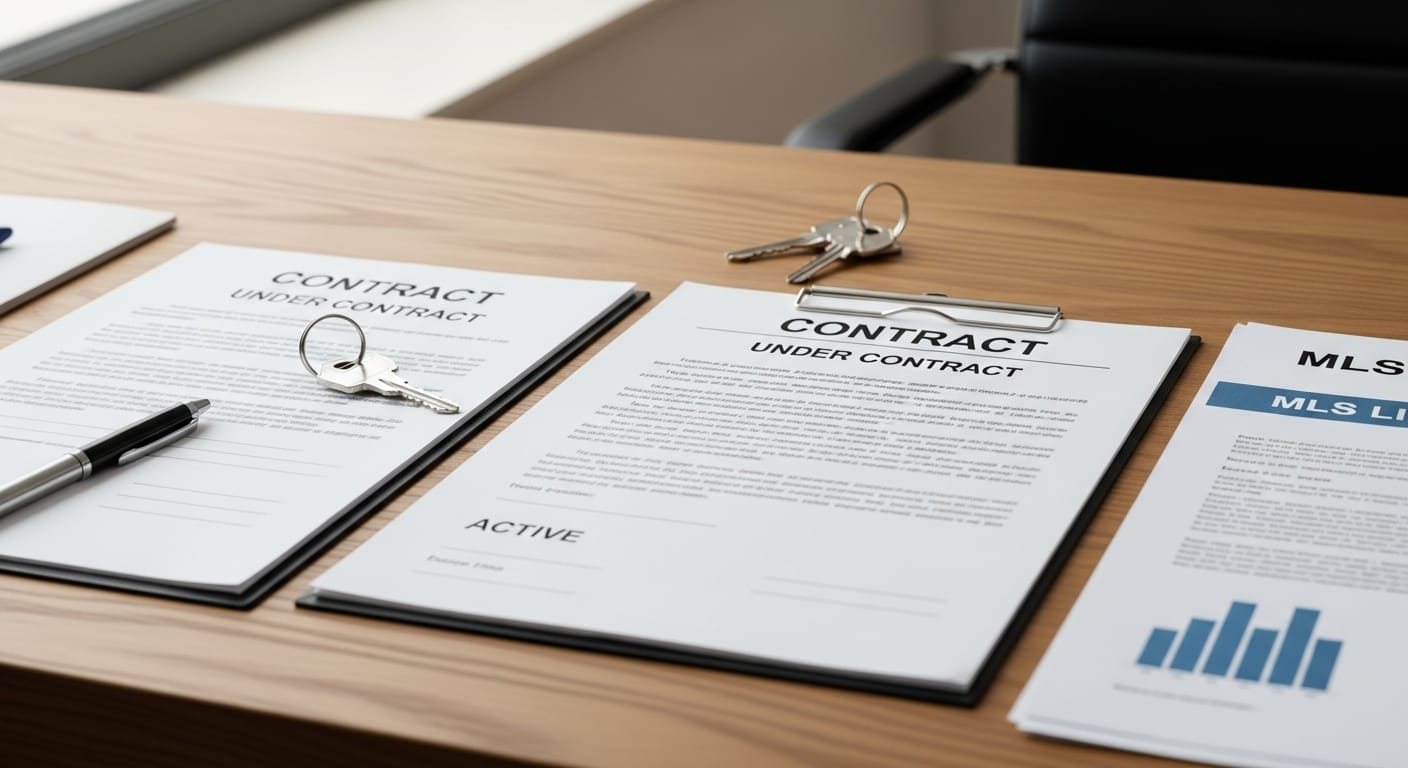Bottom Line Up Front: Active under contract means a seller has accepted an offer but the home remains available for backup offers while the buyer completes contingencies like inspections, financing, and appraisals. This status typically lasts 30-60 days and gives buyers protection while allowing sellers to receive additional offers.
When browsing real estate listings in Staten Island, Brooklyn, or Manhattan, you’ll encounter various property statuses. One that often confuses both first-time and experienced buyers is “active under contract.” Understanding this crucial real estate term can help you make smarter decisions in today’s competitive market.
Understanding Active Under Contract Status
Active under contract represents a middle ground in the home buying process. Unlike a simple sale or pending status, it signals that negotiations have begun but haven’t reached completion.
Key Characteristics of Active Under Contract Properties
Here’s what defines this unique listing status:
- Accepted offer with conditions: The seller has agreed to a buyer’s terms
- Outstanding contingencies: Specific conditions must be met before closing
- Backup offers welcome: Additional buyers can submit competing offers
- Active marketing continues: The property remains visible on MLS systems
| Property Status | Backup Offers Accepted | Contingencies Present | Listing Active |
|---|---|---|---|
| Active | ❌ | ❌ | ✅ |
| Active Under Contract | ✅ | ✅ | ✅ |
| Pending | ❌ | ❌ | ❌ |
| Sold | ❌ | ❌ | ❌ |
The active under contract definition centers on this balance between commitment and flexibility. Both buyers and sellers maintain certain protections while working toward closing.
Active Under Contract vs Other Real Estate Statuses
Understanding how active under contract compares to other listing statuses helps clarify where properties stand in the sales process.
Active Under Contract vs Pending: The primary difference lies in contingency completion. Active under contract properties still have outstanding conditions, while pending sales have satisfied all major contingencies and are proceeding to closing.
Contingent vs Under Contract: These terms are often used interchangeably, though some MLS listings distinguish between them. Both indicate accepted offers with remaining conditions.
Real Estate Listing Status Progression
Most property sales follow this typical progression through MLS listings:
- Active → Property available for offers
- Active Under Contract → Offer accepted with contingencies
- Pending → Contingencies satisfied, proceeding to close
- Sold → Transaction completed
In the Staten Island real estate market, this progression typically takes 45-60 days from initial offer to closing.
Why Properties Stay Active Under Contract
Properties maintain active under contract status due to specific real estate contingencies that protect buyers during the due diligence period. These contingencies serve as safety nets, allowing buyers to exit agreements if certain conditions aren’t met.
Common Contingencies That Keep Homes Active Under Contract
Home Inspection Contingency The most frequent contingency allows buyers 7-14 days to complete professional property inspections. If significant issues emerge, buyers can:
- Request repairs or credits
- Renegotiate the purchase price
- Exit the contract entirely
Financing/Mortgage Contingency This contingency protects buyers who need loan approval. The typical 30-45 day period allows time for:
- Final underwriting approval
- Property appraisal completion
- Loan document preparation
Appraisal Contingency Banks require appraisals to confirm property values match loan amounts. This 2-3 week process can delay closings if:
- Appraised values come in low
- Additional documentation is required
- Comparable sales data is limited
Sale of Buyer’s Current Home Contingency Some buyers must sell existing properties before purchasing. This contingency can extend timelines significantly, especially in slower markets.
Title Contingency Legal title searches ensure clear property ownership. Issues requiring resolution include:
- Outstanding liens or judgments
- Boundary disputes
- Missing documentation
Expert Insight: In our experience serving New York and New Jersey markets, inspection and financing contingencies account for approximately 80% of active under contract delays. Working with experienced professionals helps navigate these periods smoothly.
Can You Make an Offer on an Active Under Contract Home?
Yes, backup offers are not only possible but often encouraged by sellers and their agents. Smart buyers understand that approximately 10-15% of contracted deals fall through, creating opportunities for prepared backup buyers.
Benefits of Submitting Backup Offers
Market Positioning: You’re first in line if the primary contract fails Negotiation Leverage: May influence primary buyers to remove contingencies quickly
Competitive Advantage: Shows sellers you’re serious about their property
How to Submit a Strong Backup Offer
Work with Experienced Agents Our real estate agents understand local market dynamics and can structure competitive backup offers. They’ll help you:
- Research comparable sales data
- Determine appropriate offer prices
- Structure favorable terms and timelines
- Navigate multiple offer situations
Competitive Pricing Strategies Backup offers often need stronger terms than initial offers. Consider:
- Offering at or above asking price
- Reducing contingency periods
- Increasing earnest money deposits
- Providing flexible closing dates
Earnest Money Considerations Larger earnest money deposits demonstrate commitment. In competitive markets like Brooklyn real estate, substantial deposits can differentiate your offer.
Timeline: How Long Can a House Stay Active Under Contract?
Contract timelines vary based on contingency types and local market conditions. Understanding typical timeframes helps set realistic expectations for both buyers and sellers.
Additionally, understanding closing costs in New Jersey helps buyers prepare financially for contract completion, particularly when navigating backup offer situations where quick financial readiness is crucial.
Typical Timeframes by Contingency Type
Inspection Period: 7-14 days
- Professional inspections completed
- Repair negotiations concluded
- Buyer decision finalized
Financing Contingency: 30-45 days
- Loan application processing
- Underwriting and approval
- Final loan documentation
Appraisal Contingency: 2-3 weeks
- Property appraisal scheduling
- Appraiser property visit
- Report completion and review
Overall Contract to Closing: 30-60 days The complete process from accepted offer to closing typically spans 1-2 months, though complex transactions may take longer.
Factors Affecting Timeline Length
Several variables can extend or shorten active under contract periods:
- Loan type: Cash purchases close faster than financed deals
- Property condition: Well-maintained homes have fewer inspection delays
- Market conditions: Competitive markets often have shorter contingency periods
- Buyer qualifications: Pre-approved buyers move through processes more quickly
Active Under Contract from a Seller’s Perspective
Sellers benefit from keeping listings active under contract rather than immediately changing to pending status. This strategy provides multiple advantages while maintaining market flexibility.
Why Sellers Keep Listings Active Under Contract
Protection Against Deal Collapse Maintaining an active listing provides insurance if primary contracts fail. Sellers can:
- Continue showing the property
- Receive and evaluate backup offers
- Maintain marketing momentum
Ability to Receive Backup Offers Multiple backup offers create favorable negotiating positions. Sellers might:
- Encourage faster contingency removal
- Negotiate better terms with primary buyers
- Have immediate alternatives if deals fall through
Market Positioning Advantages Active listings maintain market visibility and can:
- Generate additional interest
- Create urgency among potential buyers
- Demonstrate property desirability
Seller Contingency Management
Experienced sellers and their agents actively manage contingency periods by:
- Setting clear deadlines for each contingency
- Requiring regular communication from buyers
- Maintaining backup offer pipelines
- Monitoring contract compliance
Active Under Contract in Different Markets
Regional variations in MLS systems and local market practices affect how active under contract properties are handled. Understanding these differences helps buyers and sellers navigate various markets effectively.
Regional Variations in Active Under Contract Practices
New York Real Estate Markets In Manhattan, Brooklyn, and Staten Island markets, active under contract periods tend to be shorter due to competitive conditions. Typical characteristics include:
- Inspection periods: 5-10 days
- Financing contingencies: 21-30 days
- Backup offers: Highly encouraged
- Contract terms: Often favor sellers
New Jersey Property Market New Jersey home buying follows similar patterns but with some variations:
- Attorney review periods: 3-day standard
- Longer inspection contingencies: 10-14 days
- Municipal requirements: Additional time for approvals
- Title work: More complex in some counties
MLS System Differences
Different MLS systems use varying terminology and categories:
REBNY (Real Estate Board of New York)
- “Exclusive” indicates active under contract
- Limited backup offer protocols
- Shorter contingency periods standard
Garden State MLS (New Jersey)
- “Under Contract” clearly labeled
- Backup offer systems integrated
- Attorney review period highlighted
Staten Island Board of Realtors
- Local market customs prioritized
- Flexible contingency negotiations
- Strong backup offer traditions
Frequently Asked Questions
What does active under contract mean in Staten Island real estate?
In Staten Island, active under contract means a seller has accepted an offer but certain conditions must be met before closing. The home remains available for backup offers during this period. This status typically lasts 30-45 days while buyers complete inspections and secure financing.
Can I still tour a home that’s active under contract in Brooklyn?
Yes, many Brooklyn sellers allow showings for active under contract properties, especially if they’re accepting backup offers. Contact the listing agent to request a showing, but understand the primary buyer has first rights to purchase.
How long do homes stay active under contract in New Jersey?
New Jersey homes typically remain active under contract for 30-60 days, depending on contingencies. Homes with cash offers may move faster, while those requiring financing or inspections may take longer.
Should I make a backup offer on an active under contract property in Manhattan?
Making a backup offer in Manhattan’s competitive market can be smart if you love the property. About 10-15% of contracted deals fall through, giving backup buyers opportunities. Work with an experienced agent to structure competitive terms.
What’s the difference between active under contract and pending in New York?
In New York’s MLS system, active under contract means contingencies remain outstanding and backup offers are accepted. Pending status indicates all contingencies are satisfied and the sale is proceeding to closing with minimal chance of failure.
Can sellers cancel an active under contract agreement in Staten Island?
Sellers cannot cancel without cause once under contract. However, if buyers fail to meet contingency deadlines or contract terms, sellers may terminate and accept backup offers. Consult with a qualified real estate attorney for specific situations.
Key Takeaways for Real Estate Success
Understanding active under contract status empowers both buyers and sellers to make informed decisions in today’s dynamic real estate market. Whether you’re exploring current listings or considering backup offer strategies, this knowledge provides a competitive advantage.
For buyers, active under contract properties represent opportunities rather than closed doors. With proper guidance from experienced professionals, backup offers can lead to successful purchases even in competitive markets.
Sellers benefit from the flexibility active under contract status provides, maintaining market presence while working toward successful closings with primary buyers.
Ready to navigate the active under contract landscape? Contact Robert DeFalco Realty for personalized guidance on your next real estate transaction. Our expertise in New York and New Jersey markets ensures you’ll make informed decisions whether buying or selling.
For more insights into real estate processes and market trends, explore our comprehensive real estate blog covering everything from buyer agency agreements to estate sales guidance.
Legal Disclaimer
This guide reflects current real estate practices as of 2025. Market conditions and legal requirements may vary by location and change over time. Always consult with qualified real estate professionals and legal advisors for specific situations.
Important Legal Notice: The information provided in this article is for educational and informational purposes only and should not be construed as legal, financial, or professional real estate advice. Real estate laws, regulations, and market practices vary significantly by state, municipality, and jurisdiction. The content herein is based on general practices in New York and New Jersey markets and may not apply to your specific situation or location.

